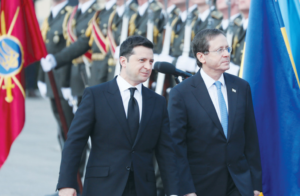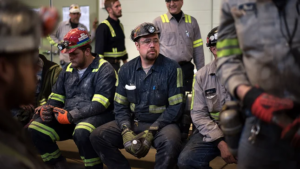Roman Rain Tree’s mother was gravely ill with cancer when he asked her if she thought their Native American tribe would gain federal recognition while their ancestral homeland in Fresno County bore a name many consider offensive.
Gina Charley said no but levied a challenge for her son: “If you think you can change it, then show them the pen is mightier than the sword,” Rain Tree said Friday.
Though the 2013 conversation was one of their last — Charley died the following month — Rain Tree was inspired to fight to alter the name of Squaw Valley, Calif., a town of about 3,600 people.
On Jan. 1, Rain Tree — on behalf of the coalition Rename S-Valley Fresno County — submitted a proposal to change the name to the Board on Geographic Names, a federal body tasked with naming geographic places. About two months earlier, in November, Secretary of the Interior Deb Haaland declared the term “squaw” derogatory and instructed the board to implement procedures to remove the name from federal usage. Under the secretarial orders, a task force was also created to find replacement names for geographic features on federal land with the name.
Rain Tree, a Fresno resident, has ties to the Dunlap Band of Mono Indians and the Choinumni tribe, both indigenous to the valley, and spent summers at his grandparents’ home in the area growing up.
But he said the land is tainted by the term “squaw,” which Rain Tree called “the equivalent of the ‘C-word’ but specific for Indigenous women.” Nuum Valley is the proposed new name, though Rain Tree said it may be adjusted. “Nuum” means “the people” in the Western Mono language.
Even within a broader cultural conversation examining place names, the term “squaw” has earned particular scrutiny.
“The term has historically been used as an offensive ethnic, racial and sexist slur, particularly for Indigenous women,” the U.S. Department of the Interior said in a news release.
Several states have outlawed using the term in place names, including Montana, Oregon, Maine and Minnesota. In September, the historic Squaw Valley ski resort in Lake Tahoe changed its name after its owners acknowledged the name was offensive. Still, the name is prevalent across the country. There were 650 federal “land units” with the name when Haaland’s secretarial orders were issued in the fall.
Rain Tree appealed to federal officials after pushing local leaders to take up the conversation for more than a year. Those local leaders, he said — singling out Fresno County Supervisor Nathan Magsig — have largely given him “the cold shoulder.” He first reached out to Magsig’s staff in the summer of 2020.
Magsig, who represents the valley, said he’s not opposed to a name change but wants the effort to come from local residents and tribe members, calling Rain Tree and some of his supporters in his coalition “outsiders.” (A petition on Change.org calling on officials to change the name has garnered more than 35,250 signatures.) The supervisor, elected to the board in 2016, also described Haaland’s directive as “a mistake” because of its overly broad approach.
“What makes something hateful is the context and how the person’s heart is, who’s making those statements,” Magsig said, adding that he has not found evidence that the valley’s name — which he said was potentially given more than 120 years ago — was generated in malice.
Conversations around name changing have made him “a little fearful,” he said, likening the movement to McCarthyism of the 1950s.
“What are we solving by changing the names today? Is it making us a more united people? Or is it dividing us more?” he said. “I want to focus on those things which actually unite us, both locally and regionally.”
Shirley Guevara, vice chair of the Dunlap Band of Mono Indians, supports the initiative in an individual capacity “as an elder and a woman,” but there hasn’t been broad consensus among the tribal council, which 71-year-old Guevara chalks up to complacency with “the local hierarchy.”
Guevara lives in neighboring Dunlap, an area she said used to include the valley, and said the name Squaw Valley reminds her of old western TV shows such as “The Lone Ranger,” in which Native Americans — especially the women — were treated poorly.
“Squaws were worse than dogs — [who] could be used and traded, and killed and shot, and therefore there was no value to a squaw,” Guevara said of the depictions.
Guevara’s daughter, Taweah Garcia, 45, said that the “dehumanizing” term is still used today and that its presence in place names keeps alive not just the derogatory language but also the racist attitudes and actions.
“We have to do it for future generations, we have to do it for our ancestors. We have to do it for all of our relations — the four directions,” Garcia, also a Dunlap resident, said of the rename. “If not now, when?”
The valley, Garcia said, is part of their tribe’s ancestral homeland but estimates the area has about 11 or 12 names with the offensive term that need to be changed.
The coalition supporting the name change and Magsig are at an impasse on how to go forward on a local level. The supervisor said he has called on Rain Tree and his supporters to hold a meeting with valley residents, offering them a public space. Rain Tree wants Magsig to spearhead the meeting, arguing that it’s the job of the elected official and that he has more resources to maintain a COVID-safe environment.
Meanwhile, the coalition is now engaged in a “waiting game,” Rain Tree said, as federal officials consider the proposal. The final decision is expected to take many months, and potentially up to a year, “given the high level of interest in this matter,” said Alex Demas, a spokesperson for the U.S. Geological Survey.
As part of the process, the Board on Geographic Names will solicit input from the Fresno County Board of Supervisors, the California Advisory Committee on Geographic Names and all 574 federally recognized tribes, Demas said in an email.




